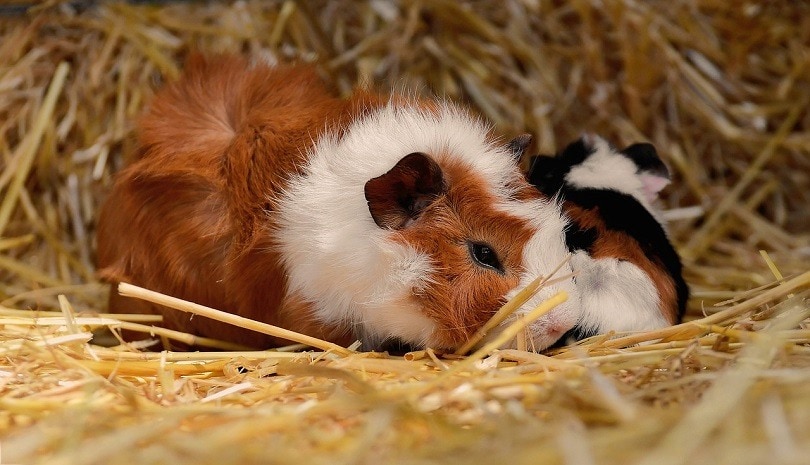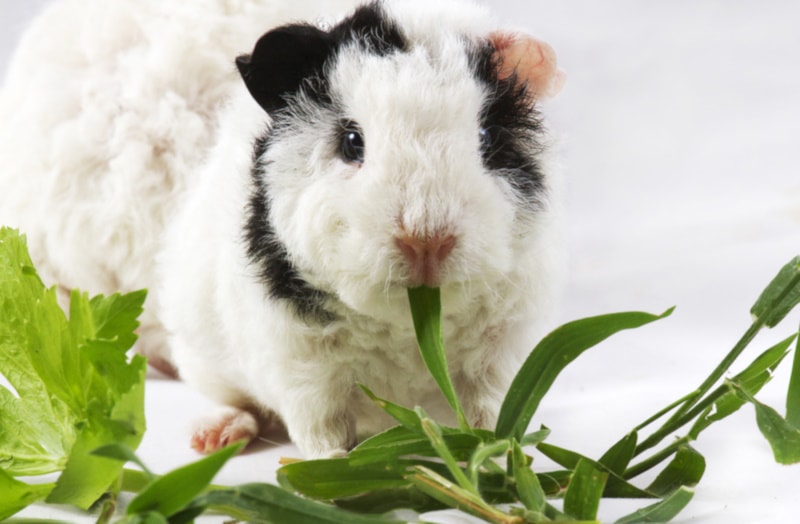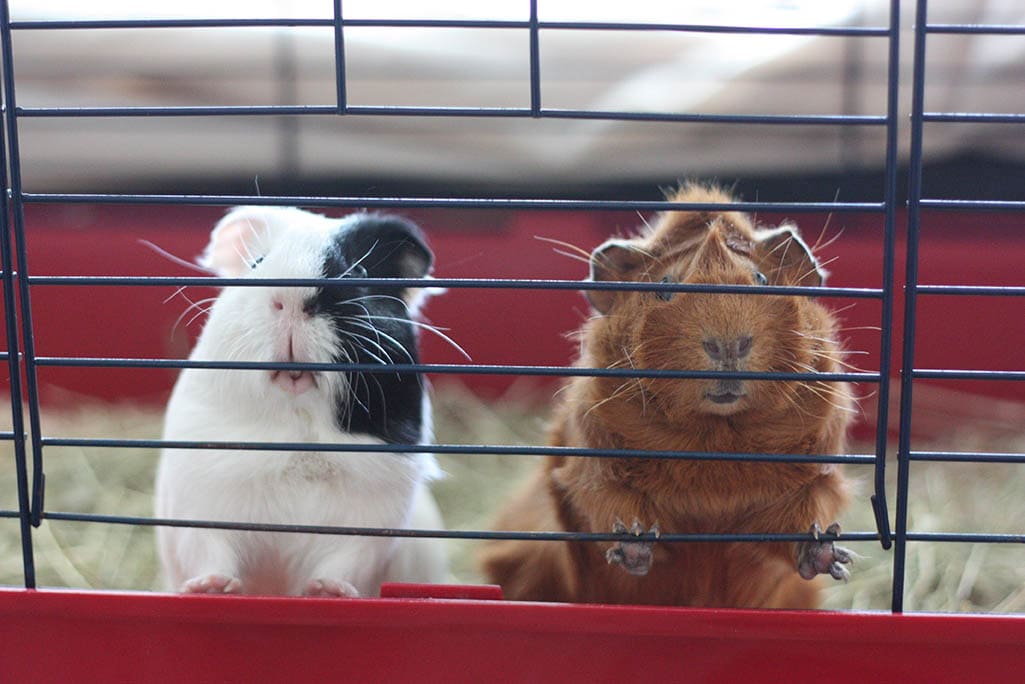
Click to Skip Ahead
The Merino guinea pig is one of the least common guinea pig breeds. While no one knows where the Merino originated, the Caviidae family was domesticated centuries ago, dating back to 5000 B.C. in South America’s Andean regions.
Merino guinea pigs look similar to the Coronet piggies, though Merinos have curly and textured hair instead of straight. If you are lucky enough to adopt a Merino guinea pig, you’ll find that you’ll have to spend quite a bit of time brushing and clipping their mane, hence why they’re recommended for experienced guinea pig owners.
So, what about the Merino makes them unique and so rare? In this article, find out everything that you need to know about Merino guinea pigs.
Breed Overview
Size:
10–12 inches
Weight:
1.5–2.5 pounds
Lifespan:
4–6 years
Similar Breeds:
Texels and Coronets
Suitable for:
Experienced guinea pig owners
Temperament:
Curious, friendly, and calm
Sometimes mistaken for Texel guinea pigs, these cute, curly-haired mammals were likely bred from Coronet and Rex guinea pig breeds. When you look closely at the Merino’s coat, the pattern resembles that of a Coronet guinea, though the thick, soft, and curly hair stems from the Rex gene.
People adore Merino guinea pigs because they look like miniature lambs. Their fur is as soft as sheep’s skin and cute as a button. Aside from their appearance, the Merino guinea pig has a laidback attitude, has excellent health, and is super affectionate once you bond with them. Who wouldn’t want a miniature lamb as a couch buddy?
Merino Guinea Pig Characteristics
How Much Do Merino Guinea Pigs Cost?

Depending on where you live, guinea pigs are typically sold from $30 to $50 each. Although the Merino guinea pig is a relatively rare breed, they average a higher price. You can expect to spend approximately $50 to $70 for a Merino guinea pig.
Guinea pigs are herd animals, so they’ll feel most comfortable with one or more cage mates. If you’re getting one guinea pig, adjust your budget to get two to avoid loneliness and depression.
When considering the costs of your Merino piggy, you must also consider the monthly costs, such as food, bedding, entertainment, etc. Altogether, you can expect to pay a one-time fee of $60 (average) for one piggy and ongoing costs of up to $100 per month.
Temperament & Intelligence of the Merino Guinea Pig
Guinea pigs are considered intelligent rodents that excel in multiple innovative areas. Each guinea pig can differentiate sounds and colors and have a range of memories that help them survive in the wild.
The Merino is a popular option among guinea pig owners due to their cuteness, intelligence, and temperament. Most guinea pigs are social and bond well with human interaction. However, what separates the Merino guinea from others is that they are one of the most intelligent breeds of their kind.
Merinos have a great memory. They can recognize who is part of the family and who isn’t, and they can even recognize signs and gestures for training. All guinea pigs are equipped with a range of vocal communication, though the Merino can distract predators by sounding like something else farther away.
Intelligence, alongside the Merino’s naturally calm, friendly, and outgoing temperament—who wouldn’t adopt this rare breed?
Do Merino Guinea Pigs Make Good Pets?

Merino guinea pigs generally make excellent pet cavies, though they are not suited for beginner or inexperienced guinea pig parents. They tend to be high maintenance due to their grooming needs.
Merino pigs can also be costly for monthly upkeep like bedding, hay, food, and entertainment. If you live in an apartment or near nosy neighbors, you may reconsider getting a Merino guinea pig, as they can sometimes be surprisingly noisy.
However, aside from the occasional excited squeals, grooming necessities, and monthly costs, Merino guinea pigs are friendly, affectionate, gentle, and clean. If well cared for, you’ll likely have them for 5+ years.
Does the Merino Guinea Pig Get Along With Other Pets?
All guinea pigs need a friend or two, so it’s always recommended that no matter which guinea you get, you should get two or more. Like other guinea pigs, Merino guineas live among each other in the wild and feel safer in groups than alone.
However, when it comes to other house pets like cats, dogs, rabbits, or other animals, it depends on the traits and temperaments of your other pets. For example, your Merino will likely have no issues with a docile or aloof cat that is overall friendly.
But if you have an excessively hyper dog or dominant rabbit, your Merino will feel afraid, which would be detrimental to their overall well-being. Generally speaking, whenever you introduce your Merino guinea pig to other pets, ensure that there is always supervision and understand when your guinea has had enough.
Things to Know When Owning a Merino Guinea Pig:

Merino guinea pigs have basically the exact needs of their relatives. What makes the Merino so different is their looks and attitude. Some guinea pigs are more aggressive by nature. Merino guinea pigs are closer in temperament to their parent breeds, the Coronet and Rex. Both are adaptable and gentle breeds.
Food & Diet Requirements
A Merino guinea pig’s diet includes various fruits, vegetables, hay, and pellets. Hay is needed to help prevent dental problems and sustain the digestive tract. When choosing commercial food, choose vitamin C-fortified pellets, as guinea pigs cannot produce vitamin C themselves.
Regarding fruit and vegetables, a little variety each day will keep your Merino happy and healthy throughout their lives. Choose fruits high in vitamin C and vegetables with a high water content.
So, in a day, this might look like an unlimited supply of hay, a cup of fruits and vegetables cut into bite-sized pieces, ⅛ a cup of vitamin C-fortified pellets, and one or two treats per guinea pig.
Habitat & Enclosure Requirements
Adequate space for your Merino guinea pig is about 7.5 square feet. You’ll want to add 3 square inches more for each added guinea pig. Space is essential because guinea pigs cannot jump or climb and rely solely on floor space.
A Merino’s enclosure must be equipped with mostly hay and bedding material. Bedding material may be soft washable cloths, towels, or cured white wood chips. Each enclosure must have adequate toys, water, and food.
Getting your guinea pigs a separate playpen to transport them outside or to other areas of your home is wise. Merino guinea pigs can become bored with the same scenery day in and day out. However, if your enclosure is built outside, ensure that the cage is blocked from predators and harsh weather like wind, rain, and extreme heat.
Exercise & Sleeping Needs

Guinea pigs are prey species, so they’ll spend much time hiding, burrowing, and foraging in their enclosure. A good rule of thumb is to get them out of their enclosure for 30 minutes daily to a place where they can roam free (yet supervised), either inside or outside your home.
A playpen or outdoor enclosure is a good fit for your Merino piggie, as they’ll get fresh air, grass, and weeds to munch on and the daily exercise requirements that they need.
Merino guinea pigs need at least 4 to 6 hours of sleep daily. Although most guineas don’t sleep all at once, they’ll take 30-minute intervals throughout the day.
Create a routine for your Merino where they get their recommended nutrition in the morning, sufficient exercise in the afternoon, and sleep in the evening. Merinos thrive on routine, which will help them stay active and remain healthy throughout their lives.
Training
Training guinea pigs is challenging, though some guinea pigs are more obedient than others. Depending on their independence and bond with you, the Merino are more intelligent than their guinea relatives and are likely to learn quicker than others.
Merino guinea pigs can learn your voice, but more than that, they can understand different pitches in tone, so they’ll understand the difference between positive and negative feelings. New evidence states that guinea pigs are becoming adequate emotional support animals for people with emotional disorders due to their friendly and docile nature.
It’s best to start training your Merino piggy young, as they’ll learn quicker, bond with you more efficiently, and understand more easily.
Grooming

When it comes to Merino guinea pigs, they are considered high maintenance due to the daily grooming requirements. Merino guinea pigs’ fur is as curly and soft as sheep’s wool. They tend to shed a lot and need tons of brushing and trimming. Without a proper grooming routine, your Merino guinea pig will become matted and dirty quickly.
Another thing to remember is that longer-haired guineas tend to be prone to ear problems. So, keeping up with regular baths is a good idea. Only experienced guinea pig owners should consider owning a Merino guinea pig, due to their grooming needs.
Lifespan and Health Conditions
A healthy Merino guinea pig’s lifespan is approximately 4 to 6 years. Although most guinea pigs live up to 7 years, 6 years is a happy life for your pocket pal. Merino guinea pigs are also prone to illnesses, such as:
Male vs. Female
Generally speaking, there isn’t much difference in attitude or behavior regarding male and female Merino piggies. However, a male guinea pig is usually a pound heavier and slightly longer than a female.
In the wild, males sometimes fight to the death to claim dominance, whereas females are more relaxed. This is why having two unneutered males is not a good idea. Pairings work best when there is a fixed male and a few females.
3 Little-Known Facts About the Merino Guinea Pig
Here are a few little-known facts about the Merino guinea pig that may surprise you.
1. The Merino Got Their Name From Sheep
Have you heard of Merino sheep wool? Merino is the softest and finest wool of all sheep, which represents that of the Merino guinea. Merino guinea pigs have the softest and most curly fur of all guinea pigs. It’s no wonder that people say that they closely resemble lambs!
2. The Merino Is a Rare Breed
A Merino guinea pig is rare due to their appearance and calm and well-balanced temperament. Although all guinea pigs are unique in their own ways, it’s challenging to find an adorable guinea pig whose personality complements their looks.
3. The Merino Guinea Pig Is One of the Most Intelligent
Above other guinea pigs, the Merino will pick up subtle clues and sounds quicker than their cousins. It is unknown why the Merino is more intelligent than other guineas, though it has been found that they learn relatively quickly.
Final Thoughts
When adopting a Merino guinea pig, you must consider a few things. Firstly, ask yourself, “Can I commit to the daily grooming requirements that a Merino needs, and am I confident that I can provide a daily routine for my Merino that will support a healthy lifestyle?”
Most guinea pigs need only basic requirements, such as a nutritional diet, unlimited sources of hay and water, and a few hours a day of bonding time and closeness. If you have a busy schedule or are a new guinea pet owner, start with short-haired breeds first to get into the routine of owning a guinea pig.
However, if you are dedicated to committing to a high-maintenance guinea pig that will reward you with compassionate and cuddly behaviors, the Merino is the perfect fit for you.
See also:
- 10 Best Cages for Two Guinea Pigs in 2023 – Reviews & Top Picks
- Rex Guinea Pig Info: Pictures, Personality & Traits
- 13 Guinea Pig Breeds (With Pictures)
Featured Image Credit: Alexas_Fotos, Pixabay








